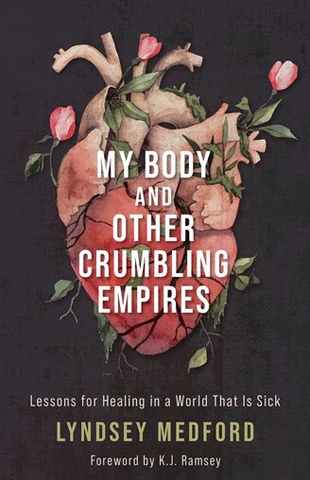We talk about being “embodied,” but rarely do we talk about what that means. This book by Lyndsey Medford — who holds a master of theological studies degree from Boston University, lives in Charleston, South Carolina, and has a rare, chronic autoimmune disease — explores embodiment in careful detail.
The sickness the author writes about is personal, but it is also writ large. She writes about the interconnectedness of our private and public health, and how living with sicknesses that are chronic (seemingly without solutions) teach us about how we are supposed to live cooperatively (together) in ways that care and protect everyone.
This is a book about compassion — for yourself. Medford begins by explaining that sixty percent of human beings live with some form of chronic or incurable illness, even though “we’re told we’re unusual, or failures.”
Then she links these mostly private illnesses with the larger world of which we’re a part: “I believe we are canaries in the coal mine of a breaking earth, and our embodied existence, our boundaried lives, our networks of care offer prophetic presence to the world.”
Fragility draws us to other people, or at least it should. We need each other. And recognizing human fragility and the interconnectedness we share should lead us to develop greater systems of support and care. “The thing is, I no longer order my own world,” Medford writes. “The thing is, I never did.”
She is understandably critical about the American health system. Chapter 3 is titled, “American Healthcare and Other Oxymorons.” Her own saga of seeking healing is at the center of the stories she recounts, and her experiences, often told in memoir form, are skillfully offered to provide hope and advice for anyone who suffers from illness or disability.
Medford writes from a Christian perspective, having grown up an evangelical Protestant and then moved into a broader, more progressive, understanding of faith and practice. Her place of beginning is always the intrinsic worth of our bodies as God-given and valuable. “We experience illness as whole people. We heal as whole people,” she explains in the chapter titled, “Healing Comes from Inside Out.” Later, speaking of her body in the third person, Medford writes: “She is no stranger to the language of desperation and rage; but she also communicates in registers of desire, pleasure, rest, and relief; she knows the music of sorrow and sharing; she is fluent in limits, seasons, paradoxes, relationality, and never-ending change.”
It is this wholeness — of each individual, of communities, of existence together on this planet — that is the macro picture of what Medford has to say in a book of wisdom and experience.
